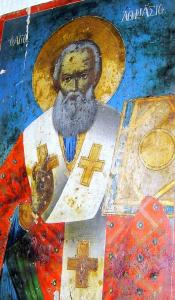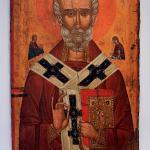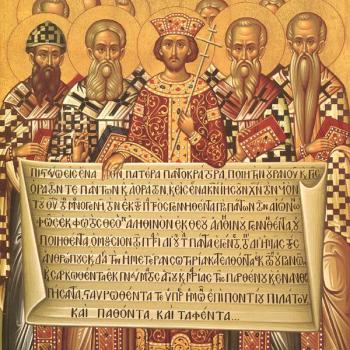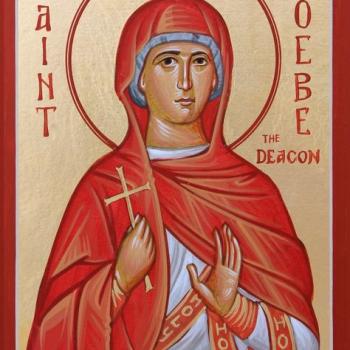
While the theological truths of the Catholic Church are expressed in and through words, they must not be confused with the words themselves. Even the best, most carefully chosen words can be misinterpreted, leading people to believe or accept erroneous teachings. Similarly, other words, which sometimes have had unorthodox interpretations associated with them, can later be employed by the church when it finds an orthodox way of engaging them. This was something the Fathers of Nicea came to recognize when they promoted the divinity of Christ by saying, in accordance with his divine nature, he is homoousios (of the same nature) with the Father. They had to acknowledge that the word homoousios had a rather troubling past, as it was used by heretics. But what was condemned was what the heretics meant with the word, so that, if others used it with a different meaning, then the word could be used. Some orthodox thinkers, concerned by the way homoousios had been interpreted in the past, thought perhaps other words could be and should be used. When they considered the issue further, and saw the way various words were being used in Christological debates, they came to accept homoousios not only was acceptable, but superior to orthodox words, like homoiousios (of like nature) to describe the relationship of the persons of the Trinity.
This is why St. Cyril of Jerusalem, who, upon learning of the Nicene definition and its use of the homouision, questioned it, though later, upon reflection came to accept it. Similarly, we can find St. Basil the Great, in the development of his Trinitarian theology, began with homoiousion and slowly found homoousion to be the superior term, but he did so in a way to suggest that homoiousion, so long as it was interpretated in an orthodox fashion, was also an acceptable term. Neither St. Cyril nor St. Basil were ever Arians who denied the divinity of Christ; their concern was with the vocabulary which developed around Nicea. They came to understand and accept that their belief as the same as that held by the Nicenes, even as the Nicenes accepted that, before their acceptance of the technical vocabulary used at Nicea, they were always orthodox.
Through his letters and theological treatises, we can see the unity of St. Basil’s thought, even though he would change the way he would present theological dogmas and doctrines. He always recognized how difficult it is to present the mysteries of the Christian faith with words, and often thought (as found in his defense of the divinity of the Holy Spirit), the best approach was to do so indirectly. Nonetheless, he accepted that Christians would have to present their belief in and through words, which meant, he was always concerned with the way people interpreted words used in theological treatises. Since he knew the way various heretics had used homoousios, he was worried that people would follow their example and come to a heretical conclusion. For this reason, he initially focused on the similarity or likeness (homoiousios) between the Father and the Son, saying that they must be similar in all ways (but yet have some sort of distinction, an issue which he and the other Cappadocians would explore as they developed the technical vocabulary needed to discuss the various persons through the word hypostasis):
How, then, we should say that the Son is consubstantial with the Father without falling into any one of the meanings mentioned, please describe more fully to us. In fact, we have interpreted that, whatever by way of hypothesis the substance of the Father is understood to be, this the substance of the Son absolutely must be understood to be. Therefore, if anyone should say that the substance of the Father is light intellectual, eternal, and unbegotten, he will say that the substance of the Only-begotten also is light intellectual, eternal and unbegotten. But, for such a meaning it seems to me that the expression ‘alike without difference’ fits better than the word ‘consubstantial.’ For light which does not differ from light either more or less, I think can right be said not to be the same (because each exists in its own limit of substance) but to be alike in substance, exactly and without difference. [1]
St. Basil eventually came to see how homoiousios had also been used to lead people astray, letting him therefore reconsider the use of homoousios and find it to be the superior term. Nonetheless, he did so in such a way as to remind his readers that homoiousios could still be used if it is properly interpreted:
But, if I express my personal opinion, I accept the term like in substance’ if ‘invariably is added to it, for then it conveys the same meaning as consubstantial, according, assuredly, to the sound conception of the word ‘consubstantial. And the Fathers in Nicea, because they also held this view, consistently introduced the word ‘consubstantial’ when they addressed the Only-begotten as Light from Light and True God from True God, and so on. Now, it is impossible to conceive of any variation of light in relation to light, or of truth in relation to truth, or of the substance of the Only-begotten in relation to that of the Father. Therefore, if anyone accepts this interpretation as I have given it, I approve. But, if the qualification ‘invariably’ is omitted, as was done by those at Constantinople, I hold the expression in suspicion on the grounds that it lessens the glory of the Only-begotten.[2]
Which, therefore, led him to declare:
In fact, we are frequently accustomed to think of likeness’ meaning resemblance as faint and for the most part inferior to the archetype. Therefore, because I believe the word ‘consubstantial’ is less liable to misinterpretation, I myself adopt it. [3]
This is also the way St. Athanasius would eventually understand the situation: the word homoiousios was not heretical, but it could be used heretically if it were used to suggest that the Father and Son are merely alike, that is, to imply that there is a substantial difference between them. This is because he said, by being homoousios, the Father and the Son are going to be homoiousios, but, by saying they are homoiousios, this did not mean they were necessarily going to be homoousios. This concession can be found in the way he talked about the teaching of Basil of Ancyra:
Those who deny the Council altogether, are sufficiently exposed by these brief remarks; those, however, who accept everything else that was defined at Nicæa, and doubt only about the Coessential, must not be treated as enemies; nor do we here attack them as Ario-maniacs, nor as opponents of the Fathers, but we discuss the matter with them as brothers with brothers , who mean what we mean, and dispute only about the word. For, confessing that the Son is from the essence of the Father, and not from other subsistence, and that He is not a creature nor work, but His genuine and natural offspring, and that He is eternally with the Father as being His Word and Wisdom, they are not far from accepting even the phrase, ‘Coessential.’ Now such is Basil, who wrote from Ancyra concerning the faith. For only to say ‘like according to essence,’ is very far from signifying ‘of the essence,’ by which, rather, as they say themselves, the genuineness of the Son to the Father is signified. Thus tin is only like to silver, a wolf to a dog, and gilt brass to the true metal; but tin is not from silver, nor could a wolf be accounted the offspring of a dog. But since they say that He is ‘of the essence’ and ‘Like-in-essence,’ what do they signify by these but ‘Coessential ?’ For, while to say only ‘Like-in-essence,’ does not necessarily convey ‘of the essence,’ on the contrary, to say ‘Coessential,’ is to signify the meaning of both terms, ‘Like-in-essence,’ and ‘of the essence.’ [4]
This can also be seen in the way St. Hilary of Poitiers defended the Nicene teaching. He pointed out that orthodox dogmatics often develop out of a particular need, to defend the truth of the faith, and so, to speak about those matters, words are going to be used. In doing so, care must be had, recognizing that even the orthodox are speaking on issues which are best left unspoken:
The guilt of the heretics and blasphemers compels us to undertake what is unlawful, to scale arduous heights, to speak of the ineffable, and to trespass upon forbidden places. And since by faith alone we should fulfill what is commanded, namely, to adore the Father, to venerate the Son with Him, and to abound in the Holy Spirit, we are forced to raise our lowly words to subjects which cannot be described. By the guilt of another we are forced into guilt, so that what should have been restricted to the pious contemplation of our minds is now exposed to the dangers of human speech. [5]
Our focus should be on the intended meaning behind the words. We must make sure that we are not speaking at cross purposes, nor find ourselves believing we accept the same teaching with others because they use the same words we do, when in reality, there is equivocation going on. The fact we don’t always understand the same thing by the same words is why Scripture is often interpreted in contradictory ways:
Heresy does not come from Scripture, but from the understanding of it; the fault is in the mind, not in the words. Is it possible to falsify the truth? When the name father is heard, is not the nature of the son contained in the name? Will He not be Holy Spirit who has been so designated? For, there cannot but be in the Father what a father is, nor can the Son be wanting in what a son is, nor can there not be in the Holy Spirit what is received. Iniquitous men confuse and complicate everything and in their distorted minds even seek to effect a change in the nature so that they deprive the Father of what the Father is and take away from the Son what the Son is. They despoil Him, however, since according to them He is not a son by nature. [6]
Thus Hilary acknowledged that one could use homoiousios to mean what the Fathers of Nicea taught, and if so, such a person is orthodox and should not be condemned:
To approve of ὁμοιούσιον, we need not disapprove of ὁμοούσιον . Let us think of the many holy prelates now at rest: what judgment will the Lord pronounce upon us if we now say anathema to them? What will be our case if we push the matter so far as to deny that they were bishops and so deny that we are ourselves bishops? We were ordained by them and are their successors. Let us renounce our episcopate, if we took its office from men under anathema. Brethren, forgive my anguish: it is an impious act that you are attempting. I cannot endure to hear the man anathematized who says ὁμοούσιον and says it in the right sense. No fault can be found with a word which does no harm to the meaning of religion. I do not know the word ὁμοιούσιον, or understand it, unless it confesses a similarity of essence. I call the God of heaven and earth to witness, that when I had heard neither word, my belief was always such that I should have interpreted ὁμοιούσιον by ὁμοούσιον . [7]
It is easy for us to become so accustomed to dogmatic definitions, and the words they used, that we forget the point is not the words themselves, but what is being taught by them. St. Athanasius and St. Hilary made this point when they wrote on Nicea and its teachings. The Fathers understood that sometimes difficult words, especially those borrowed from philosophy, could be misinterpreted. Many have contended against the choice of words being used in particular circumstances because they want to promote and defend the same truth meant by those who use such words.
We have become so accustomed to the Nicene Creed and its definition, and with it, the homoousios, we tend to confuse the teaching with the word choice itself. Just as we find in the past some could, and did, use the word heretically, so some can do so today, which is why merely using it is not proof of theological orthodoxy. This is not to deny the value of technical words like homoousios, because if they are presented and explained properly, they offer great insight to the truths of the faith, but without such guidance, rote memorization of such terms does not guarantee orthodoxy, nor does denial of them mean someone is necessarily unorthodox (as the problem might lie in their interpretation of the word).
[1] St. Basil the Great, “Letter 361 to Apollinaris in St. Basil: Letters Volume 2 (186-368). Trans. Sister Agnes Clare Way, CDP (New York: Fathers of the Church, Inc., 1955), 338.
[2] St. Basil the Great, “Letter 9 To The Philosopher Maximus” in St. Basil: Letters Volume 1 (1-185). Trans. Sister Agnes Clare Way, CDP (New York: Fathers of the Church, Inc., 1951), 42.
[3] St. Basil the Great, “Letter 9 To The Philosopher Maximus,” 42-3
[4] St. Athanasius, De Synodis in NPNF2(4):472.
[5] St. Hilary of Poitiers, On the Trinity. Trans. Stephen McKenna (New York: Fathers of the Church, Inc., 1954), 36.
[6] St. Hilary of Poitiers, On the Trinity, 36-7.
[7] St. Hilary of Poitiers, On The Councils in NPNF2(9):28
Stay in touch! Like A Little Bit of Nothing on Facebook.
If you liked what you read, please consider sharing it with your friends and family!
N.B.: While I read comments to moderate them, I rarely respond to them. If I don’t respond to your comment directly, don’t assume I am unthankful for it. I appreciate it. But I want readers to feel free to ask questions, and hopefully, dialogue with each other. I have shared what I wanted to say, though some responses will get a brief reply by me, or, if I find it interesting and something I can engage fully, as the foundation for another post. I have had many posts inspired or improved upon thanks to my readers.












